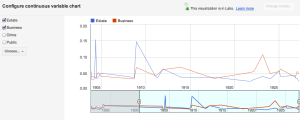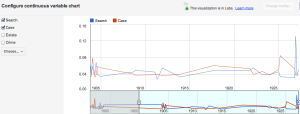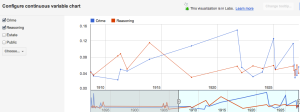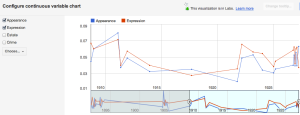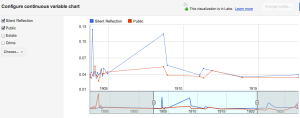Sir Arthur Conan Doyle penned all the Sherlock Holmes stories between 1891 and 1927, creating a literary legend that would not soon be forgotten. By using topic modeling techniques and some fancy algorithms, we can investigate the potential relevance of word usage in his stories.
The Great War was a momentous event that almost exactly bisected Doyles’ creations, so I will view my ten topics through this lens. I found an interesting website for historical background on London during this time period, which helped me to identify significant events.
Estate vs Business
In contrasting estate and business, I noticed a spike in the former before 1905 and again before 1910. This could have been because British colonies had large tea estates in India. However, estate crashed back down after 1910 and business led throughout the rest of the time period. It is possible that the industrial growth of London led to this change, and both words are lower during the war and flu pandemic of 1918.
Search vs Case
Regarding search and case, there is a slight rise in each during the war years. Once again, the flu of 1918 and the peak of both words during the 1910-1920 decade may involve correlation rather than causation. The term search may also have increased during the war because soldiers could be missing in action.
Crime vs Reasoning
Reasoning was mentioned more than crime prior to 1915, but the use of crime skyrocketed after this, calming back down in the 1920’s. This fits well with the suffrage movement and trade unions growing, as this disrupted established society. From the 20th century London website:
The suffragettes, the Irish ‘Home Rule’ movement and trade unions all agitated for change, sometimes with violence. In 1918 some political demands were met through the Representation of the People Act, which gave the vote to working men and women over 30.
Appearance vs Expression
Appearance quite possibly became less important than expression after the war, due to the realities it forced upon the people of London. This trend continued through the 20’s, as the growth of jazz may have led to expression becoming more common.
Silent Reflection vs Public
Silent reflection had an interesting spike in 1908, and it dropped precipitously, becoming equal to public by 1914. It is possible that the Alien Act impacted this word usage, as many immigrants tried to come to London during this period. Perhaps many Londoners had thoughts about the impact on their society, but the war decreased their time for such thoughts.
While I am not certain about these linguistic developments, I feel topic modeling could be an important tool to help scholars revisit the past, specifically helpful in distinguishing how history affects word usage.
